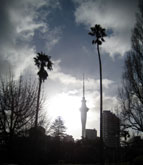“Digital Humanities and Academic Change.” University of Auckland. 31 August 2007.
 Link library to facilitate discussion.
Link library to facilitate discussion.- Link library #2 to facilitate discussion.
- More photos of Auckland/U. Auckland
| 2007 |
“Digital Humanities and Academic Change” (U. Auckland, New Zealand)Categories Talks Talks
|
“Digital Humanities and Academic Change.” University of Auckland. 31 August 2007.
 Link library to facilitate discussion.
Link library to facilitate discussion.
| 2007 |
“Digital Humanities and Academic Change” (Victoria U., Wellington, New Zealand)Categories Talks Talks
|
“Digital Humanities and Academic Change.” Victoria University, Wellington. 30 August 2007.
| 2007 |
“Digital Humanities Strategies” (National Library of New Zealand)Categories Talks Talks
|
Presentation at discussion meeting to exchange ideas on the role of the humanities in information-technology development strategy with representatives of the National Library of New Zealand, The Encyclopedia of New Zealand, and Research and Education Advanced Network New Zealand( REANNZ). National Library of New Zealand, Wellington. 29 August 2007.
| 2007 |
“Digital Humanities and Academic Change” (Victoria U., Wellington, New Zealand)Categories Talks Talks
|
“Digital Humanities and Academic Change.” Seminar on recent trends in research in the humanities and arts; with co-discussant Julie Ellison. Victoria University, Wellington. 29 August 2007.
| 2007 |
“Beyond ‘Good Enough’ Knowledge: The Humanities and Public Knowledge in the Age of Web 2.0” (Victoria U., Wellington, New Zealand)Categories Talks Talks
|
“Beyond ‘Good Enough’ Knowledge: The Humanities and Public Knowledge in the Age of Web 2.0.” Keynote for the Te WhÄinga Aronui — The Council for the Humanities’ Transformations Congress. Victoria University, Wellington. 28 August 2007.
| 2007 |
Link Library #2 (for Meetings in New Zealand, Aug.-Sept. 2007)Categories Uncategorized Uncategorized
|
Materials Related to Digital Strategy, Digital Capability Development, and the Humanities in New Zealand
Selected Quotations:
1. First sentences of the Foreword to “The Digital Strategy” by the Minister of Information Technology and of Communications (David Cunliffe): “There’s a buzz about New Zealand right now. We have vibrant communities. We have innovative people and companies at the creative cutting-edge.”
2. From “The Digital Strategy”: “It is important that we keep all the dimensions of the Digital Strategy in line. Content, Connection, and Confidence are the three enablers. Connection is necessary but not sufficient — it simply provides the means. Confidence gives us the skills and a secure online environment, whilst accessing or creating Content provides a compelling reason to make it happen.”
3. In the “The Digital Strategy,” the section on “Why We Need a Digital Strategy” begins: “The information we access through digital technologies can promote innovation, increase productivity, and enrich the quality of our lives. Content creation is not only a global business — now it can be anyone’s business. Using digital technologies to create and access our distinctive cultural content enhances our identity as New Zealanders. ICT helps us unlock our stores of national content, making them accessible to all, and it is a powerful tool for directing and expressing our creativity.”
4. From Draft New Zealand Digital Content Strategy: “The appropriate mechanisms are also needed to unlock New Zealand’s stock of current and future content, in part to provide a supply of high quality content to stimulate demand and uptake of digital technology. In stimulating demand for content however, we must also protect, preserve and promote our heritage and cultural identities, in an environment open to being swamped by the widening access to international content. Maori language, knowledge and culture, a vital part of New Zealand’s identity, is particularly vulnerable to being drowned out or appropriated by international interests unless adequately protected.”
5. From an appendix of the Council of Humanities “Research Policy Paper” (the appendix is a table titled “Sketch of the Cultural Knowledge Research System”): “Research Mode: Primarily interpretive, but including creative and social scientific methodologies. Research Outcomes: Including: Peer-reviewed academic research, contract research, catalogues . . . , conferences and seminars,[etc.]”
Observations
Links and References
| 2007 |
Link Library (for Meetings in New Zealand, Aug.-Sept. 2007)Categories Uncategorized Uncategorized
|
Selected Web Sites
Collaborative Research or Curricular Development Projects
Selected Courses